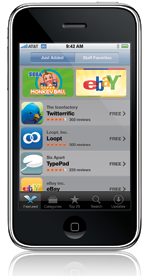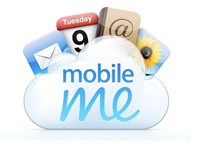 The Daily Mail’s iPhone “scoop” has inspired posts about Apple rumors. And posts about posts about Apple rumors. And posts about posts about Apple rumors, ad infinitum. This and other news after the jump.
The Daily Mail’s iPhone “scoop” has inspired posts about Apple rumors. And posts about posts about Apple rumors. And posts about posts about Apple rumors, ad infinitum. This and other news after the jump.
Continue Reading →
Tag Archives | Apple
An “iPhone Nano?” Maybe, But Surely Not This One
There are Apple rumors that ring true. There are ones that sound like they might be true. And then there are the ones that have a whiff of fantasy about them. I’d put Simon Fluendy’s report in the UK’s Daily Mail of an iPhone Nano scheduled for Christmas release in that last category.
It’s not that a simpler and cheaper iPhone is unthinkable. Actually, it would be unthinkable if one doesn’t show up eventually, and I have no reason to think that Steve Jobs and company aren’t preparing one for the holidays. (I do kinda wonder if they might want to give the current, highly profitable iPhone a bit more time as the only iPhone before they introduce a more downscale version, but who knows?)
The thing about the Mail’s report is that it’s skimpy and skimpily sourced, with the info coming from “an industry source” and “one expert.” It says that Britain’s O2 will sell the phones for “up to £150,” and there’s nothing obviously unlikely about that, I guess. But it also describes the phone as supposedly having “a touch wheel on the back and display on the front so that numbers would be dialled from behind.”
That sounds just plain weird and nonsensical; how could such a design be anything but bizarrely unusable? How would you dial numbers with a touch wheel at all?
I can’t imagine that any company would release such a phone, and particularly not Apple. And one lesson with Apple rumors is that the ones that involve alleged products which incorporate features from existing products (like the touch wheel) in ways that sound improbably clunky never pan out.
(I’m reminded of many of the rumors about the iPhone before it actually appeared–many of them involved a phone that looked and worked a lot like an iPod…but when the iPhone arrived, it had little in common with an iPod from a hardware standpoint. Apple was far more imaginative than most of the people who speculated on what an iPhone might be, and far more committed to stretching the definition of what an iPod could be.)
Designing and manufacturing a more basic, inexpensive iPhone that makes sense won’t be easy–especially since the current model delivers so much power at the relatively low price of $199. An “iPhone Nano” would probably have to be significantly cheaper to find a market, and it would be interesting to see if it could incorporate multi-touch and other features that–today at least–make an iPhone and iPhone. Of, if it didn’t have much in common with today’s iPhones, whether consumers would accept it as one.
Of course, the evolution of the iPod from one model to an array of versions with widely differing features and price points shows that Apple can turn one product into a product line, and be wildly successful at doing it. So I repeat: The company will do the same thing with the iPhone. But if it does it in the way the Mail is reporting, I’ll be amazed.
10 comments
Nullriver’s NetShare Tethering for the iPhone: It’s Baaaaaaack!
Curiouser and curiouser. Yesterday, a $10 iPhone utility from Nullriver called NetShare showed up in Apple’s App Store. It promised to let you share your iPhone’s wireless data service with a computer via the computer’s Wi-Fi connection, giving you the potential to get online in places where you can’t find a hotspot. Shortly after it appeared in the App Store, it disappeared; that was less surprising than the fact it was there in the first place, since AT&T offers no official sanction for using your iPhone as a modem.
Today? NetShare is back in the App Store. I’ve seen no official word from Apple, AT&T, or Nullriver about what’s going on here, and whether using NetShare is okay, not okay, or in some fuzzy area in between. I’ve pined for the ability to tether my notebook to my phone’s modem ever since I dumped my AT&T Tilt phone for an iPhone 3G, though, so I downloaded, configured, and tried NetShare as fast as I could.
I’ve given it only a quick try so far, not an extensive trial. For a few minutes I was up and running, using Safari to surf the Web (including YouTube) at decent speed and chatting on iChat. That was a kick. But other than that, NetShare has been kind of a pain–it’s safe to say it’s not the seamless iPhone tethering solution I’ve been looking for and would happily pay for.
NetShare works by setting up a peer-to-peer Wi-Fi network between your Mac (Windows support is promised soon) and the iPhone, then using proxy access to let your Mac piggyback on the iPhone’s internet connection. This requires some futzing around with network settings on both the iPhone and the Mac; Nullriver provides instructions, but they’re confusing in some places and simply wrong in others, and they’re far from complete. They also don’t mention the fact that they only get you as far as making Safari and iChat work; I had to reconfigure Flock to use NetShare’s proxy myself.
(Side note: A forum member over at MacRumors has provided instructions for using NetShare that are much better than Nullriver’s.)
Every time my iPhone went into sleep mode, my network connection died. I reconnected only by randomly fiddling with network settings and never figured out what I did that would get the connection working again. And when I was done testing and wanted to get back on my Wi-Fi network, I had to undo some of the settings that NetShare required me to change.
In short, if you’re a geek with a need for a way to connect a Mac via iPhone for emergency use, NetShare might fit the bill. But I found it way too much of a hassle to contemplate using it very often, even if AT&T were to give NetShare its blessings.
The good news: NetShare proves that there’s no technical reason why an iPhone can’t double as a modem, and the fact that it’s on the App Store would seem to suggest that it’s not unthinkable that a more polished tethering application along the lines of June Fabrics’ PdaNet couldn’t be approved by Apple and at least grudgingly accepted by AT&T.
But I say it again: If a future upgrade to the iPhone OS had some sort of official “Tether to Computer” option, as my Tilt did, I’d cheerfully fork over money to AT&T.
And I’d love to learn exactly what the deal is with NetShare’s appearance, disappearance, and reappearance, and whether Apple is really selling a piece of software that AT&T doesn’t want you to run…
One comment
13 Ways I’d Change the iPhone’s Interface…if I Could
 For a year now, an amazing number of people have assumed I own an iPhone. Until last week, I had to politely correct them. (My phone of late has been an AT&T Tilt.) I hadn’t bought a first-generation iPhone for three big reasons. Which were:
For a year now, an amazing number of people have assumed I own an iPhone. Until last week, I had to politely correct them. (My phone of late has been an AT&T Tilt.) I hadn’t bought a first-generation iPhone for three big reasons. Which were:
1) I worked for a large company that used Lotus Notes–as large companies are wont to do–and there was no good way to get Notes on an iPhone;
2) Every time I tried Mobile Safari, I got depressed by how hobbled such an excellent piece of software was by the slow AT&T EDGE data network;
3) I didn’t want to buy a phone that could only run the applications that Apple itself decided to produce.
Problem one went away when I departed the corporate world to start Technologizer. (Side note: I’ve been using Gmail and Google Calendar to do the stuff I used to do in Notes.) The iPhone 3G solved the second one. And with the advent of the Apple 2.0 software, the iPhone can run third-party applications, of which there are already hundreds in the iTunes Store. So last Friday, I got myself up at 2:30am and braved the lines to buy an iPhone 3G–and a week later, I’m mostly extremely pleased with it. Continue Reading →
6 comments
More MobileMe for Your Money: Apple Does the Right Thing
 Large companies don’t always seem to think they’re required to actually deliver the services they promise in order to get their money. (I still remember the time years ago when a rep at Pacific Bell–now AT&T–told me that it expected me to pay my full bill for a week-long period when I had no phone service whatsoever.)
Large companies don’t always seem to think they’re required to actually deliver the services they promise in order to get their money. (I still remember the time years ago when a rep at Pacific Bell–now AT&T–told me that it expected me to pay my full bill for a week-long period when I had no phone service whatsoever.)
So it’s nice to see the news that Apple is proactively giving everybody who signed up for its MobileMe service or was an existing .Mac user an extra thirty days of service by way of apology for the service’s erratic availability after its launch last week. Gizmodo has the text of an email in which the company admits the rollout was “a lot rockier than we had hoped” and had “lots of problems.” That’s serious crow-eating by any standard.
The company also said it’s going to stop referring to MobileMe’s data-synching as involving “push” for now, since it can currently take up to 15 minutes for e-mail and other info to travel from a Mac or PC to the Web or an iPhone.
(Incidentally, I have a MobileMe account and qualify for the extension, but haven’t received this e-mail yet; why, I’m not sure.)
MobileMe costs $99 a year, so the extra thirty days are worth around $8.25–not a huge whoop, but still nice.
I’m still playing around with MobileMe and forming a firm opinion–it’s a good idea for sure, and an ambitious one, but I wanna get a better sense of just how well it works and if the initial hiccups are over.
